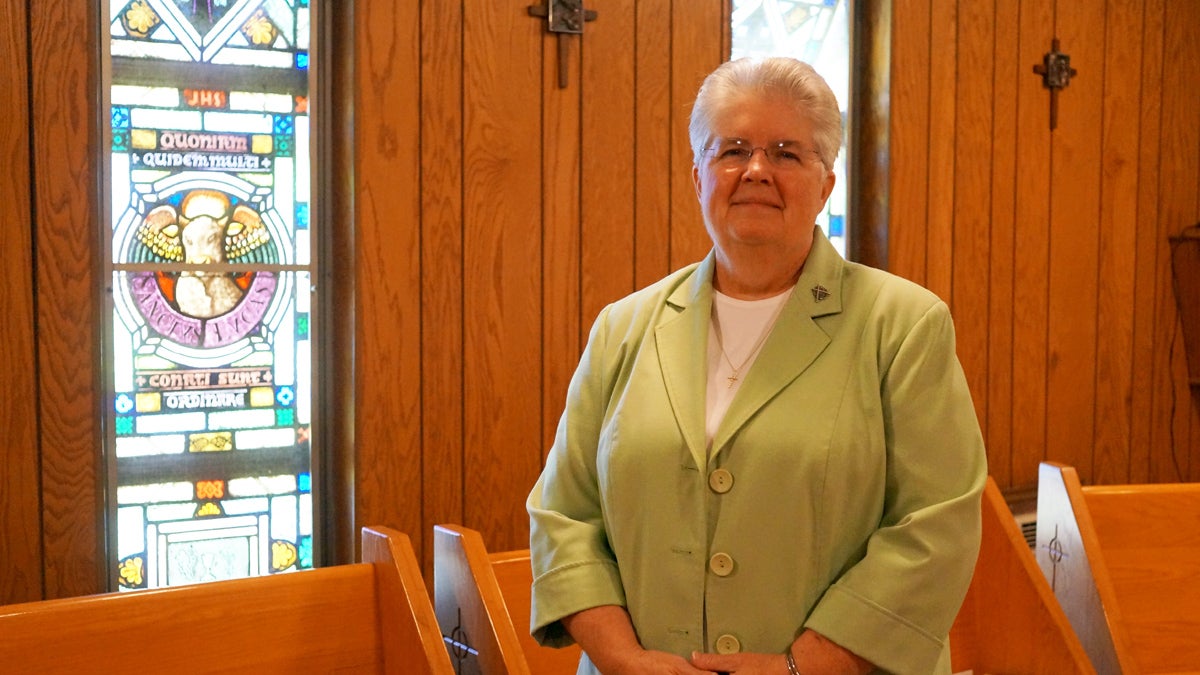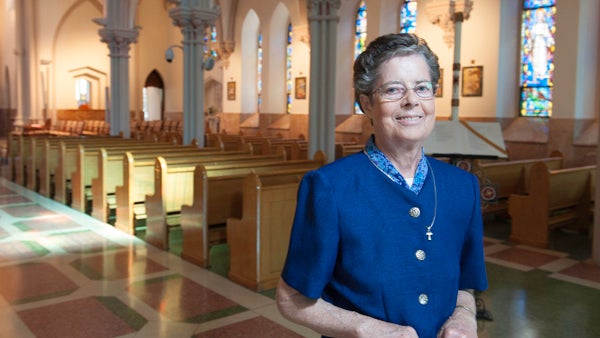Women religious look to God’s grace and Pope Francis for change
Listen
Sr. Carol Zinn is a Sister of Saint Joseph based in Plymouth Meeting, Pa. and a past president of the Leadership Conference of Women Religious. The group, which represents the majority of American nuns, was subject to a three-year investigation by the Vatican. (Katie Colaneri/WHYY)
During his first trip to New York City, Pope Francis thanked American nuns, called them “fighters.”
“I love you,” he said.
This special shout-out comes at the end of an especially contentious time between women religious and the Vatican.
Betrayed by the Vatican
Sister Carol Zinn doesn’t wear a traditional habit. Sitting in the chapel of the Epiphany of our Lord Convent in Plymouth Meeting, Pennsylvania, Zinn wears black slacks and a lime green jacket. Her short, silver hair is uncovered. Still, she says, she’s stopped in airports and other public places by people saying, “You must be a sister.”
Perhaps it’s the way she keeps calm, even during the most rattling situations. And she’s been in some rattling situations.
Zinn is a past president of the Leadership Conference of Women Religious or LCWR, the group that represents 80 percent of sisters in the United States.
In April 2012, the Vatican under Pope Benedict XVI launched an investigation of the group.
“The feelings were everything from sadness, pain, hurt, betrayal, ” says Zinn, who found herself wondering, “Why this? And how? And … what kind of moment is this for the church?”
In a report issued by an American cardinal, the Vatican claimed the LCWR had strayed from Catholic teaching and was instead promoting “radical feminist themes.”
Sisters were spending too much time advocating for the poor and not enough time protesting abortion and same-sex marriage, the Vatican said.
“We did not understand where any of those accusations, or judgments perhaps, came from, nor what they were about, and I think we still hold that today,” says Zinn.
Both sides have agreed to keep the details of the investigation under wraps.
Zinn, a Sister of St. Joseph for 47 years, says tension has always existed between men and women religious and the church’s male hierarchy.
“The church understands that there is this healthy, holy tension between the hierarchical institutional church, which holds the articulation of the belief of the community and those called to live not in the center of that, but to live … on the margins,” she says.
‘God’s grace is stronger than any dogma’
In Philadelphia, the recent firing of a same-sex married Catholic schoolteacher has thrust that tension into the headlines.
The Sisters of Mercy, the religious order that sponsors the school, fired the teacher, Margie Winters. The Archdiocese of Philadelphia has denied involvement, but Archbishop Charles Chaput has supported that decision, saying it “showed character and common sense.”
Meanwhile, one of the most prominent Sisters of Mercy, Sister Mary Scullion, has defended Winters. Scullion is the founder of Project Home and a well-known advocate for the homeless.
“While it is painful for us to have to publicly dissent, we are convinced that this is a moment when insistence on doctrinal adherence is clashing with what we believe the Spirit is unfolding in our history — just as it has in the past, with issues like slavery, the rights of women, and the environment,” reads a letter co-signed by Scullion, Joan McConnon, the parent of a Waldron Mercy Academy graduate, and James Maguire, president of the Maguire Foundation.
“I do know that conversion and transformation and change are possible, and God’s grace is stronger than any dogma,” Scullion said in an interview on WHYY’s RadioTimes.
A different challenge under Pope Francis
It was Pope Francis who brought change to the Vatican’s relationship with American women religious.
Last April, at a meeting in Rome, Vatican officials notified Zinn and three other LCWR leaders in attendance the investigation was over, three years after it began. Immediately afterward, Pope Francis invited the sisters to meet with him.
“We were just absolutely thrilled, overjoyed and shocked, all at the same time,” Zinn says.
A papal car picked them up and brought them to a meeting room in the papal palace where they spoke with the pontiff through a translator for 50 minutes.
They didn’t talk about the investigation, except to tell him that it was over. But Zinn says they immediately felt a connection with Pope Francis, who like them is from a religious order, the Jesuits. During that visit to Rome, she had already noticed a change in how she and the other sisters were treated compared with the past. She was careful to note that the Vatican under Pope Benedict XVI was always respectful, but Zinn says the officials they met with were more interested in engaging the sisters.
“I felt a definite shift, and I think it’s the shift that we’re seeing the fruit of as Pope Francis makes his way around the world,” she says.
Zinn says Pope Francis is challenging women religious in a different way: to continue serving those who are on the margins because that’s where he serves, as well.
 Sister Nora Nash is a Sister of St. Francis. (Photo by Jonathan Wilson)Sister Nora Nash is up for the challenge.
Sister Nora Nash is a Sister of St. Francis. (Photo by Jonathan Wilson)Sister Nora Nash is up for the challenge.
A Sister of St. Francis based in Aston, Pennsylvania, Nash has worked for the last 14 years as an advocate and shareholder activist with the Interfaith Center on Corporate Responsibility. Her work on the margins takes her not to soup kitchens or hospital bedsides, but to the big city board rooms of companies like Goldman Sachs, Wells Fargo and Chevron, shaking hands with what some would call the “1 percent.”
Like Zinn, Nash does not wear a traditional habit, and she has a similar calming presence in moments of tension, such as confronting the Hershey Company about exploitative child labor in the company’s cocoa fields in West Africa.
To hear Nash describe her work, it sounds deceptively simple.
“God is good, and people are basically very, very good,” she says. “We just have to keep searching for the goodness and encouraging folks to work with folks who are very, very poor.”
Nash says the pope’s two encyclicals and his most recent expression of appreciation for women religious, have encouraged her in her vocation to change, or in her words “convert” people to changing their lifestyles in consideration of the Earth and of the poor.
“I’m always in need of conversion,” she says, “So whether it’s somebody at Goldman Sachs or Chevron or some other major corporation, we all need conversion and we all need to hear what it is we might be doing.”
WHYY is your source for fact-based, in-depth journalism and information. As a nonprofit organization, we rely on financial support from readers like you. Please give today.




